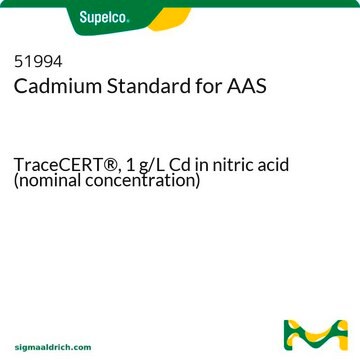270393
Tetrachloroethylene
suitable for HPLC, ≥99.9%
Sinónimos:
PCE, Perchloroethylene
About This Item
Productos recomendados
vapor density
5.83 (vs air)
vapor pressure
13 mmHg ( 20 °C)
19 mmHg ( 25 °C)
assay
≥99.9%
form
liquid
purified by
glass distillation
technique(s)
HPLC: suitable
impurities
<0.050% water
evapn. residue
<0.0005%
color
APHA: ≤10
refractive index
n20/D 1.505 (lit.)
bp
121 °C (lit.)
mp
−22 °C (lit.)
density
1.623 g/mL at 25 °C (lit.)
λ
H2O reference
UV absorption
λ: 290 nm Amax: 1.00
λ: 295 nm Amax: 0.30
λ: 300 nm Amax: ≤0.20
λ: 305 nm Amax: 0.10
λ: 350 nm Amax: 0.05
λ: 400 nm Amax: 0.03
application(s)
food and beverages
SMILES string
Cl\C(Cl)=C(\Cl)Cl
InChI
1S/C2Cl4/c3-1(4)2(5)6
Inchi Key
CYTYCFOTNPOANT-UHFFFAOYSA-N
¿Está buscando productos similares? Visita Guía de comparación de productos
Application
- Dispersive liquid-liquid microextraction as a novel enrichment approach for compound-specific carbon isotope analysis of chlorinated phenols.: This study introduces a novel microextraction technique involving tetrachloroethylene, enhancing the sensitivity and specificity of carbon isotope analysis in complex environmental samples (Martin et al., 2024).
- Photo-on-Demand In Situ One-Pot Synthesis of Carbonate Esters from Tetrachloroethylene.: This research presents a novel photochemical method for synthesizing carbonate esters from tetrachloroethylene, demonstrating its potential in synthetic organic chemistry and industrial applications (Higashimura et al., 2024).
signalword
Warning
Hazard Classifications
Aquatic Chronic 2 - Carc. 2 - Eye Irrit. 2 - Skin Irrit. 2 - Skin Sens. 1 - STOT SE 3
target_organs
Central nervous system
Storage Class
6.1C - Combustible acute toxic Cat.3 / toxic compounds or compounds which causing chronic effects
wgk_germany
WGK 3
flash_point_f
No data available
flash_point_c
No data available
Certificados de análisis (COA)
Busque Certificados de análisis (COA) introduciendo el número de lote del producto. Los números de lote se encuentran en la etiqueta del producto después de las palabras «Lot» o «Batch»
¿Ya tiene este producto?
Encuentre la documentación para los productos que ha comprado recientemente en la Biblioteca de documentos.
Los clientes también vieron
Nuestro equipo de científicos tiene experiencia en todas las áreas de investigación: Ciencias de la vida, Ciencia de los materiales, Síntesis química, Cromatografía, Analítica y muchas otras.
Póngase en contacto con el Servicio técnico











